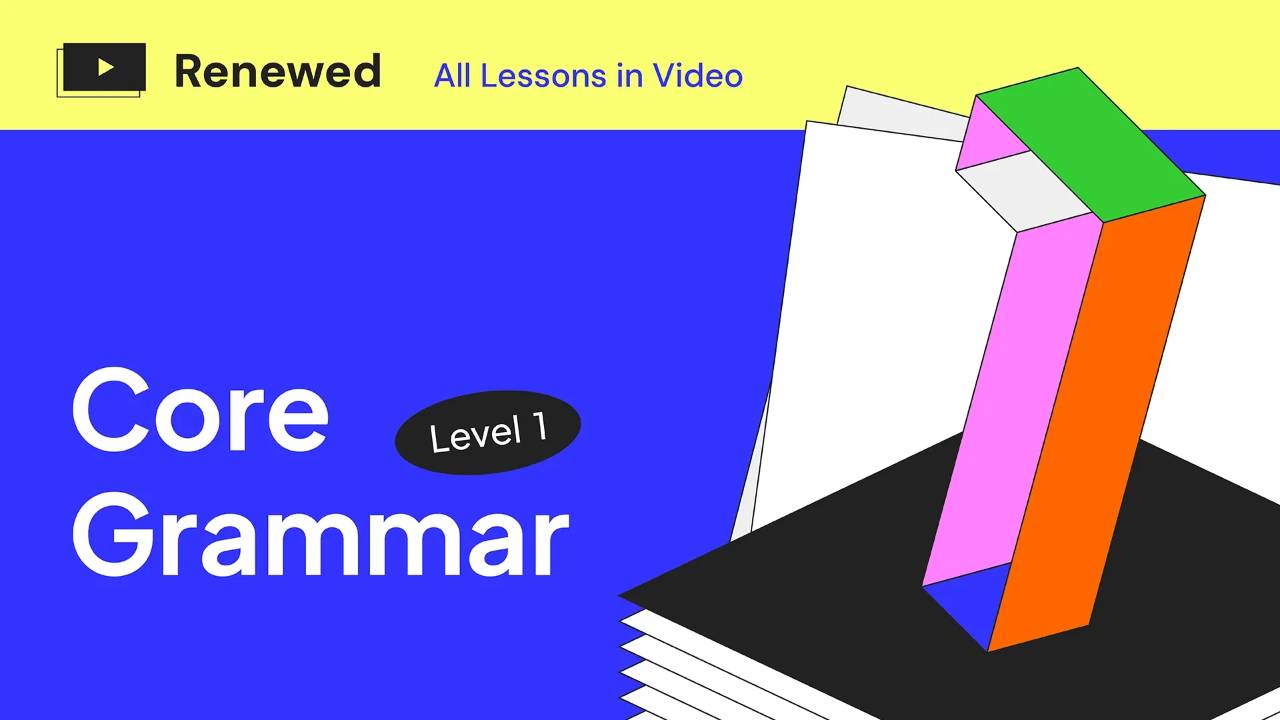"Take Your Korean Skills to an Intermediate Level!"
Sample Lessons
Main topics of the Level 4 course:
- Spacing in Korean
- Word contractions
- Expressions of frequency
- Commonly used verb-endings
- How to say "less", "most/best" and "much more/much less" in Korean
- Essential Hanja: 동(動), 불(不), 장(場)
Table of Contents
![]() Average lesson length: 16 minutes
Average lesson length: 16 minutes
Lesson 1. The more … the more … / -(으)면 -(으)ㄹ수록
Lesson 2. Do you want to …? / -(으)ㄹ래요?
Lesson 3. It can’t be … / -(으)ㄹ 리가 없어요, 할 리가 없어요
Lesson 4. Verb ending -지요/-죠
Lesson 5. “당신” and “you”
Lesson 6. Word builder 3 / 동(動)
Lesson 7. It’s okay. I’m okay. / 괜찮아요
Lesson 8. It is okay to…, You don’t have to… / -아/어/여도 돼요, 해도 돼요
Lesson 9. You shouldn’t…, You’re not supposed to… / -(으)면 안 돼요, 하면 안 돼요
Lesson 10. Among, Between / 사이에, 사이에서, 중에, 중에서
Lesson 11. Anybody, Anything, Anywhere / 아무나, 아무도, 아무거나, 아무것도
Lesson 12. To try doing something / -아/어/여 보다, 해 보다
Lesson 13. Word builder 4 / 불(不)
Lesson 14. Sometimes, Often, Always, Never, Seldom / 가끔, 자주, 별로, 맨날, 항상
Lesson 15. Any / 아무 (part 2)
Lesson 16. Spacing in Korean / 띄어쓰기
Lesson 17. Word Contractions (part 1) / 주격 조사, 축약형
Lesson 18. Most, Best (superlative) / 최상급, 최고
Lesson 19. Less, Not completely / 덜
Lesson 20. Sentence Building Drill #1
Lesson 21. Spacing (part 2) / 띄어쓰기
Lesson 22. Word builder 5 / 장(場)
Lesson 23. Word Contractions (part 2)
Lesson 24. Much (more), Much (less) / 훨씬
Lesson 25. -(으)ㄹ + noun (future tense noun group) / -(으)ㄹ + 명사, 할 것
Lesson 26. -(으)ㄴ + noun (past tense noun group) / -(으)ㄴ + 명사, 한 것
Lesson 27. I think … (+ future tense) / -(으)ㄴ/(으)ㄹ/ㄴ 것 같다, 한 것 같다, 할 것 같다
Lesson 28. To become + adjective / -아/어/여지다
Lesson 29. To gradually/eventually get to do something / -게 되다, 하게 되다
Lesson 30. Sentence Building Drill #2
Review What You’ve Learned in Level 4
What you can find in this course:

Lesson notes

Sample dialogues

Review quizzes

Review lesson
Why you'll LOVE our Core Grammar courses
-
All Levels Covered
By simply following our curriculum that covers 10 levels, you can take your Korean skills from absolute beginner all the way up to advanced. -
Short and Digestible Lessons
Each lesson is bite-sized and easy to understand, as it focuses on one grammar point at a time and provides many example sentences. -
Fun Story-based Reviews
You can review the entire course through a fun story! The final lesson of each course features a fun story that allows you to review all the grammar and vocabulary introduced in the course. -
Review Quizzes and Interactive Audio Lessons
You can test your new knowledge through review quizzes and interactive audio lessons, where our teachers ask you questions, and you can respond and check where you need to improve.
Who teaches this course?


More courses & books you might also like
My Virtual Korean Friends: Korean Speaking Practice![]()
#KoreanSpeaking #SpeakingPractice #Beginner
Korean Pronunciation Guide![]()
#KoreanPronunciation #Speaking #Beginner
Korean Sentence-building Practice![]()
#KoreanSentences #SentenceMaking #Writing
My Weekly Korean Vocabulary![]()
#KoreanWords #Vocabulary #Beginner-Intermediate
Level 4 Textbook![]()
Level 4 Workbook![]()
Level 4 Textbook & Workbook![]()







Hi TTMIK! Good day! I’m just a little bit confused about one of the examples in Level 4 Lesson 28 wherein the verb to be small which is 작다 when formed with -아/어/여지다 becomes 작아지다. Why is that? I thought -아 is used only when the verb stem ends withㅏ or ㅗ and 여 is special for 하다 only so the rest will use 어. 작다 ‘s verb stem is 작 with final consonant ㄱ therefore it should use 어 but in the example given, what was used was 아. Am I missing something? Kindly enlighten me about this. Would appreciate it a lot. Thank you!
I’m not a TTMIK team but I think it doesn’t talk about the last verb stem but instead the last vowel of the verb stem, so in 작 the last vowel is “ㅏ” so it would be 작+아지다 if you still doubt another one is 재미있다, drop 다. 재미있 it didn’t become 재미있+어지다 because of “ㅆ”but instead the last vowel which is “ㅣ” in “있”. Hope it helps
Hi! The verb 작다 became 작아지다 because the the if a word stem ends in a consonant, you should look at the vowel before the last consonant. In that case 아 is the last vowel before ㄱ so 아 was used.
*because if the word stem ends…
Hi everyone! I am learning korean and I am at level 4. If anyone is intersted in learning with someone I’d be glad to leave my KakaoTalk id: purplelily7 and my ig is : lydionysus_
Feel free to message me 🙂
Hi Everyone, and How are your hyun woo sir you are the best Teacher of mine learning Korean I am Learning Korean from last 2 years from different channels including talk to me in Korean and I have Completed my 03 Level of Korean, but in Talk to me in korean my level is 7 Means it is High Intermediate learners so I started to revising from the E-book of TTMIK because some days back only I got these E-book But I regret that Why I have learned from so many different Channels Because TTMIK has Everything in their Website and I am very much Enjoying review from there Audio and E-book Lesson. Everyone believe me I am very much Enjoying to learn Korean here. I have Increased my time of learning from 3 to 5 hours and I am never get bored at the time of Learning from TTMIK. Because the Explanation of Hyun Woo Sir is great, Enjoyable and all the team members work is also very much fun and Interesting They are very Hard work They are the Great Teachers who are giving their best to their Students and also great efforts. English is my second language and I have learned very easily because in India we are used to for English language. But Never felt Enjoyable during Learning English than Korean. All credit goes to Talk to me in Korean Thanks A lot every one for reading my comments and Thanks a lot to all teachers of TTMIK. Inshallah If I will Come to Korea I will Definitely meet you people face to face. My All Best Wishes with you people that Inshallah I hope 1 day your Office become one of the biggest Institute of Leaning Korean in South Korea. To all Team Members “Hwaighting”.
We appreciate your thoughtful and kind comment. 🙂 The most memorable thing in your comment would be that you enjoyed learning Korean with us because that’s our goal ! We will do our best to make more helpful materials so that you can learn a lot from them. Hope you continue to learn Korean with us for a long time. ^^ 화이팅 !
여러분 안녕하세요 전 오늘부터 TTMIK와 함께 한국어를 공부하기 시작해서 너무 감사하고 앞으로 내 한국어를 어떻게 좋아질 건지 궁금해요. 난 한국에서 1년 동앙 있기 때문에 한국어를 공부하기 사작했고 계속 하고 있는데 이제 내 고양(콜롬비)에 사니까 한국어를 연습할 사함이 없고요. 난 TTMIK에 대한 좋은 말을 많이 들었는데 TTMIK와 함께 공부하자고 생각하지 않았어요. 오늘 진짜로 좋은 지간이 하게 됐어요. 재미있는 수업에서 배운 대로 한 마디를 쓸게요.
“TTMIK와 함께 공부하는 학생들은 갈수록 한국어를 더 잘해요”
감사합니다 ! 🙂 남겨주신 댓글을 이해하는 데 전혀 어렵지 않았어요. 자연스러운 한국어에요 ^^ 앞으로도 TTMIK과 함께 열심히 공부해요! 화이팅 ~!
Hi! I’m just wondering about the sentence ending in one of the examples in Lesson 20: “어쩌면 비가 내릴지도 몰라요”.
Was the -지도 모르다 ending discussed in any lessons prior to Lesson 20? I might have missed it, as I had no clue about this ending until it came up in Lesson 20.
Thank you! More power to TTMIK!
Thank you for asking us. 🙂 We don’t cover ‘-지도 모른다’ until Level 4. You can find ‘-지 잘 모른다’ in Level 6 lesson 8. Happy studying ^^
그럼 저도 코멘트를 남기고 싶어요. 저는 작년부터 한국어 배워요. 그때는 너무 힘들었으니까 1월에 공부하기 그만하지만 요즌은 다시 시작했어요.
우리 부모들은 아주 바빠서 제가 고양이에게 한국어로 말해요. 발음이 정말 나쁜 것 같은데 열심히 계속 연습할 거예요!
실수 있으면 알려주세요 :))
Awesome ! 🙂 Hope you enjoy learning Korean with us !
Wow idk if its wrong i dont think so, but i am amazed at how good youre. Like i understood everything but i would never thought I could write a paragraph as you. Could we help each other?
Lesson 4 quiz answer:
“졸려서 자고싶어요 그런데 내일이 시험이에요”
I’m sleepy so I want to sleep but tomorrow is the exam
이거 맞아요?
Perfect 🙂
I’ve been speaking broken Korean for 10 years now. But I’ve decided to really learn the language since the start of the Community Quarantine here in the Philippines. Thank you TTMIK for all these helpful and wonderfully made lessons! I’m about to start Level 4 now!
여러분 건강하세요 ~
Hi 🙂 Thank you so much for learning Korean with us ! We’re glad that our lessons are helpful for you. Keep up the good work ! ^^ Hope you stay safe and healthy ~! ^^
안녕하세요! 저는 아비다 이에요. 저는 열다섯살 학생 이에요.
지금 코로나바이라스 때문에 학교 안 가요. 집에서 공부 해요. 우리 선생님들이 줌에(ZOOM) 까르쳐요. 항상 들지않은데, 나중에 공부 해요.
여러분 공감하세요. 공감수록 더 좋아요.
마지막에 TTMIK 너무 많이 감사합니다.
(if anything is wrong please correct me)
Hi Abida! I think there are just 2 errors and its very minor. The first one is “저는 아비다 이에요.” You should remove the spacing in between “아비다” and “이에요”. In addition, “이에요” should be “예요” since the last syllable of your name, “다” ends with a vowel. The second one is “까르쳐요.” There’s only a spelling error so it should be “가르쳐요” from the verb 가르치다. By all means, you did pretty well. Good luck with school!
감사합니다!
안녕하세요 아비다 …. 우리 친골 수 있어요?
id kakaoTalk : SmileyAngel
죄송해요. 저는 kakaotalk 없어요. ㅠㅠ
그리고, 늦게 대답변서 죄송해요. 😓
감사합니다. ❤️
공감을수록*
I understand every grammar point but could only understand the final listening in a very general way, even repeating it so many times. Perhaps I am lacking vocab. Still, is it ok to proceed to level 5? ):
I’m in a similar situation: not much of a listening difficulty, but apparently a lack of vocabulary. However, I allow myself to proceed based on this indication at the top: “Listen to the dialogue between X and Y, and check how much you can understand just by listening to the 100% Korean dialogue, and then study with the transcript and translation below.”
Two things I do and it’s not explicitly required, though can be what they mean with “study with the transcript and translation”: I make my own version of a transcript, then check against TTMIK’s. Then, after having the right transcript, I translate it — and of course also check that against the site’s translation.
I guess the audios are more of a “checkpoint” or “landmark”, just to see that we’re still not there. But even if it gets more complicated, we’re still getting at least some parts of it. Try listening to the previous audio challenges, for instance. You’ll notice that those are now 100% understandable (or near that).
I remember having a small quiz at the end of each level, but it’s missing now. Perhaps due to the new website. Anyone knows where to find it?
In the first lesson of this chapter, there actually is a quiz. But in all the following ones it’s only available for Premium membership, I think.
Re : ㄹ 리가 없어요,
Can the -가 in 리가 ever be omitted ?
Is there a ㄹ 리가 있어요 ?
그럴 리가 없어요=그럴 리 없어요 (ㅇ)
가 can be omitted 🙂
About to start level 4. Let’s goooo!
Good job 🙂
Hi everyone. I’ve created a group in instagram. The purpose is to help each other to learn korean and practice the language together. If u want to be add in this group, please add me in instagram: @lilx0u
안녕하세요!!! TTMIK 레손들 정말 감사해요!!! 저는 한 질문 있어요. What is the difference between 같이 and 함께 and are they interchangeable? Same goes for 이제 and 지금. Thanks in advance!!
When you want to say ‘together’, you can use both ‘같이’ and ‘함께.
ex) “우리 같이 가자.” “우리 함께 가자.” “너랑 같이 사과 먹고 싶어.”, “너랑 함께 사과 먹고 싶어.” ->All of these are correct.
However, when you want to say “like/as” , you can only use ‘같이(처럼)’ . (not 함께)
ex) “쟤는 너같이(너처럼) 착해=He/She is kind like you” (ㅇ) “쟤는 너함께 착해” (x)
As for 이제 and 지금, they both have the same meaning as well : “now” . ex) 지금부터=이제부터=from now on
But, in some situations, they can’t be interchangeable. I’ll give you an awkward example.
-> A: 너 언제 왔어?=When did you get here? B: 지금 ! (ㅇ) 이제 ! (x) Hope this helps. 🙂
Hey .. Question here .. Lesson 9 (으)면 안 되다
Example : 팔면 안 돼요 should it be = 팔으면 안 돼요
Please explain the use of (으) on this rule . thanks
Ends with a vowel or ㄹ => -면
Ends with a final consonant => -으면
Happy studying!
안녕하세요 ! 제 하루에 대해서 뭔가 썼어요. 선생님, 정정해 좀 줄 수 있습니까 ? 미리 정말 감사합니다 🙂
오늘 깨운 다음에, 가족이랑 같이 아침 먹고, 밖에 산책을 나갔어요. 산책 동한, 제가 사람들은 많이 만났지만, 코로나 바이러스 때문에, 우리 이야기하지 않았어요. 집에서 왔을 때, 제 부모님들은 낮잠을 자고 있고 제 동생은 콤퓨터로 게임을 놀고 있었어요. 지금은, 오후 3시예서 한국어 계속 열심히 공부하고 있을 거예요.
Merci beaucoup 🙂
Wow! Awesome! You are doing really great.
오늘 일어난 다음에 가족이랑 같이 아침 먹고 밖에 산책을 나갔어요. 산책하는 동안 사람들을 많이 만났지만 코로나 바이러스 때문에 이야기 하지 않았어요. 집에 왔을 때 부모님은 낮잠을 자고 계셨고 동생은 컴퓨터로 게임을 하고 있었어요. 지금은 오후 3시예요. 한국어 계속 열심히 공부할 거예요.
Happy studying! ♥️
Thank you so much, I love everything about TTMIK <3
오늘 일어난 다음에,가족이랑 같이 아침 먹고, 밖에 산책을 나갔어요. 산책 동안 저는 사람들을 많이 만났지만 코로나 바이러스때문에 서로 이야기하지 않았아요. 집에 도착했을 때, 제 부모님들은 낮잠을 자고 계셨고 제 동생은 컴퓨터로 게임을 하고 있었어요. 지금은 오후 3시여서 한국어 계속 열심히 공부하고 있을 거예요.
HELLO!! TTMIK TEAM. first of all thank you so much for your hard work. You guys are amazing. I m having so much time listening to u guys.
I have a question. When we are conjugating 되다 to for example present tense form arent we supposed to add -어 fuse the ㅣ syllable of the verb stem to form 여. But in the examples it is 돼/ Can u plz explain how does this work?
vowel of 되다 is ㅚ not l
되어 -> 돼 / 되었다 -> 됐다
뵈어 -> 봬 / 뵈었다 -> 뵀다
쐬어 -> 쐐 / 쐬었다 -> 쐤다
Covid-19 때문에 전 집을 떠날 수 없었지만 훨씬 더 열심히 한국어를 공부했어요 ㅋㅋㅋㅋㅋ TTMIK는 정말 잘 조직되고 효과적이에요! 수고해줘서 모두에게 고마워요. 레벨 5에서 9까지 완성하기를 고대하고 있어요.
You’re doing great! 잘하고 있어요! 파이팅!
I love this site. It’s awesome!
I love this site, too!
TTMIK has kept me sane while desk warming in Japan.
Hope we can keep you sane! 😀
I’ve been learning Korean for a year through children’s books and had difficulties in grammar. But ttmik helps me a lot. Explaining thoroughly. Thank you so much for your lessons and I’ll keep learning.
Thank you! Happy studying!
In this corona time, talk to me korean ,has helped me to study korean by staying at home. Thank you so much for your help.
Thank you for studying with us! Stay safe!
Is there any way to download all pdfs or mp3s together? It’s tedious trying to download them one at a time.
Sorry for the inconvenience. 😭
Hello TTMIK! I would ask a question regarding to lesson 1, 을수록/ㄹ수록 which part is
학생일수록 which I don’t kinda get. Since ㄹ수록/을수록 should be attached on verb stem but the 학생 isn’t a verb right? ㅠㅠ Anyways thankyouuu 너무 너무 감사드립니당
From what I understood, I think its because the 을/ㄹ 수록 part is not attached to the noun ”student” itself but the the ”이에요” part. If you say 학생이에요, it means I/he/they is/are a student, right? So if you attach the 을/ㄹ 수록 part to the verb ”to be”, it becomes 학생일수록 , which in that particular case means ”espacially if you are a student”. Again, this is from my understanding so I might be wrong, but I hope it’s still helpful. 🙂
I kinda get it, thanks a lot! 님 고마워용 ㄱㅅ
I believe the answer is in the podcast for that lesson.